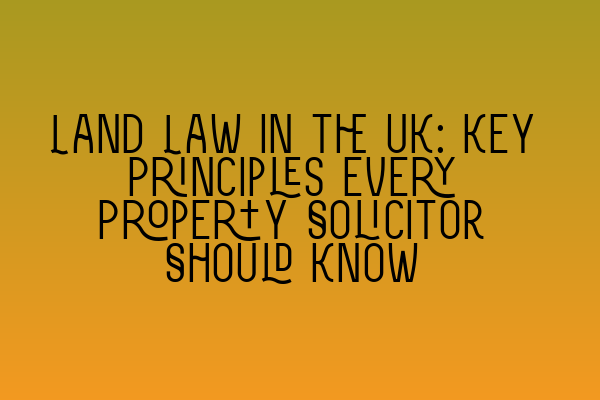Land Law in the UK: Key Principles Every Property Solicitor Should Know
As a property solicitor, having a solid understanding of land law is essential. Land law in the UK encompasses a wide range of legal principles and regulations that govern the ownership, transfer, and use of land. In this blog post, we will explore some of the key principles of land law that every property solicitor should be familiar with.
1. Freehold and Leasehold Estates
One of the fundamental concepts in land law is the distinction between freehold and leasehold estates. A freehold estate grants the owner absolute ownership of the land, while a leasehold estate allows for the temporary use and occupation of the land under a lease agreement.
Understanding the differences between these two types of estates is crucial when advising clients on property transactions. It is important to clarify whether the client is purchasing a freehold property or leasing a property, as this will have significant implications on their rights and obligations as a property owner.
2. Estates in Land
Within the realm of land law, different types of estates exist. These include fee simple absolute, life estates, fee tail, and estates for years or periodic tenancies. Each type of estate has its own specific characteristics and legal implications.
Being familiar with these various estates will enable a property solicitor to provide accurate advice on matters such as the duration of a lease or the nature of an interest in land. This knowledge is crucial for drafting legally sound documents and ensuring that clients are fully aware of their rights and responsibilities in relation to their property.
3. Easements and Covenants
Easements and covenants are important concepts within land law that relate to the rights and obligations associated with a property. An easement is a right that one party has over the land of another, such as a right of way or a right to light, while a covenant is a promise or agreement that runs with the land.
Understanding the intricacies of easements and covenants is essential when advising clients on property transactions and disputes. As a property solicitor, you may need to negotiate the terms of an easement or interpret the obligations imposed by a covenant. Having a comprehensive understanding of these concepts will enable you to effectively protect your client’s interests.
4. Adverse Possession
Adverse possession is a legal principle that allows a person to claim ownership of land that they have occupied and treated as their own for an extended period of time. The requirements for adverse possession vary depending on jurisdiction, but generally involve a certain period of continuous occupation and open and notorious use of the land.
Being aware of the rules and requirements surrounding adverse possession is crucial for property solicitors. It is not uncommon for disputes to arise regarding the ownership of land, and understanding the principles of adverse possession will enable you to advise clients on their rights and the potential risks associated with a claim of adverse possession.
5. Land Registration
In the UK, land registration is governed by the Land Registration Act 2002. This act introduced a system of compulsory land registration, which means most properties in England and Wales are now registered with the Land Registry. Land registration has simplified the process of transferring ownership and provides a secure and reliable record of property ownership.
As a property solicitor, it is essential to have a sound understanding of the land registration system. This includes knowing how to conduct searches, interpret title registers, and deal with issues such as restrictive covenants or charges on the property. Being proficient in land registration will help you navigate property transactions smoothly and ensure that your clients’ interests are protected.
Conclusion
Land law is a complex and multifaceted area of legal practice, and having a solid understanding of its key principles is crucial for property solicitors. By familiarizing yourself with concepts such as freehold and leasehold estates, estates in land, easements and covenants, adverse possession, and land registration, you will be well-equipped to provide expert advice and representation to your clients.
At SQE Property Law & Land Law, we understand the importance of staying up to date with the latest developments in land law. Our team of specialist solicitors is highly experienced in all aspects of property law and can provide expert guidance on any property-related matter. Contact us today to discuss your needs and find out how we can assist you.
Related Articles:
– SQE 1 Practice Exam Questions
– SQE 1 Practice Mocks FLK1 FLK2
– SQE 2 Preparation Courses
– SQE 1 Preparation Courses
– SRA SQE Exam Dates
